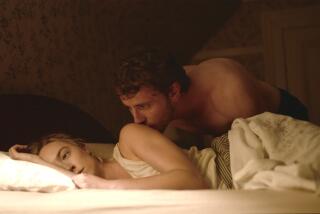‘Solomon’ Tells of Romance’s Tragic Consequences
- Share via
By the time the heavy-handed “Solomon & Gaenor” is over, it has become such a punishing exercise in the self-evident that one is left numb and eager for escape.
The precious few Welsh pictures that surface in the U.S. show a country gorgeous and populated by people of nobility and good humor. This is not one of those pictures. Although the countryside is as beautiful as ever, it is populated by people puritanical and narrow-minded in the extreme.
The setting for this 1999 Oscar nominee for best foreign-language film is a 1911 coal-mining town, the kind familiar from “The Corn Is Green” and “How Green Was My Valley.” On the other side of a mountain is another community, in which an ever-increasing number of Jews from Eastern Europe has settled.
Among them is a family from Lithuania that runs a pawnshop, where it also sells fabric. One day the store’s regular outside salesman, who crosses over the mountain to the coal town to sell cotton fabric door-to-door, is unavailable, and the family’s studious eldest son, Solomon (Ioan Gruffudd), is sent in his place.
In the course of his rounds, he knocks on the door of a row house, the home of a miner’s family, and its eldest daughter, Gaenor (Nia Roberts), answers. She is lovely and demure; he is handsome, shy, romantic. It is completely natural that the attraction between them should be mutual and nearly instantaneous.
Both come from oppressively strict religious families, and Solomon’s parents would no more accept Gaenor than hers would accept Solomon, who reflexively passes himself off as a Gentile, calling himself Sam Livingstone.
*
You understand Solomon’s urge to rebel and Gaenor’s equally strong urge to respond to him. You comprehend how a romance could develop so swiftly between the two of them that Solomon could lose his bearings.
Even so, what’s hard to understand is that Solomon risks getting Gaenor pregnant without telling her that he is a Jew. Honesty on his part would have given them the chance to weigh carefully the depth of their love for each other and deal with the reality that commitment to each other would result in both being cast out by their families and necessitate a workable plan of escape and survival.
But, sad to say, Solomon proves to be a coward and a fool, and his silence sets in motion near-inevitable tragedy that writer-director Paul Morrison stretches out for another increasingly depressing and ponderous hour.
This is lamentable, for Morrison has actually painstakingly laid the foundation for a much stronger and more original film. He sets his story in motion with economy and style, and he adroitly makes implicit the point that people for whom life is hard and uncertain cling all the more tightly to their religion for sustenance, becoming increasingly intolerant of all other beliefs.
“Solomon & Gaenor” recalls Bo Widerberg’s 1967 art-house hit “Elvira Madigan,” in which a married army officer runs off with a tightrope walker in 19th century Sweden. They were as much outcasts as Solomon and Gaenor in early 20th century Wales.
But Widerberg, a socially conscious filmmaker if ever there was one, knew how to play up a doomed romantic idyll and avoid weighing it down with more commentary than it could bear. Besides, he had the wisdom to have the whole ill-starred romance play out to the strains of Mozart’s Piano Concerto No. 21 (Second Movement).
* MPAA rating: R, for sexuality and a scene of violence. Times guidelines: some lovemaking, nudity and several sequences of violence.
‘Solomon & Gaenor’
Ioan Gruffudd: Solomon
Nia Roberts: Gaenor Rees
Sue Jones Davies: Gwen Rees
William Thomas: Iris Rees
Mark Lewis Jones: Crad Rees
A Sony Pictures Classics release. Writer-director Paul Morrison. Producer Sheryl Crown. Executive producers Andy Porter, David Green. Cinematographer Nina Kellgren. Editor Kant Pan. Music Ilona Sekacz. Costumes Maxine Brown. Production designer Hayden Pearce. Art director Frazer Pearce. In English, Welsh and Yiddish, with English subtitles. Running time: 1 hour,40 minutes.
Exclusively at the Music Hall, 9036 Wilshire Blvd., Beverly Hills, (310) 274-6869; the Town Center 5, 17200 Ventura Blvd., Encino, (818) 981 9811; and the Colorado, 2566 E. Colorado Blvd., Pasadena, (626) 796-9704.
More to Read
Only good movies
Get the Indie Focus newsletter, Mark Olsen's weekly guide to the world of cinema.
You may occasionally receive promotional content from the Los Angeles Times.









